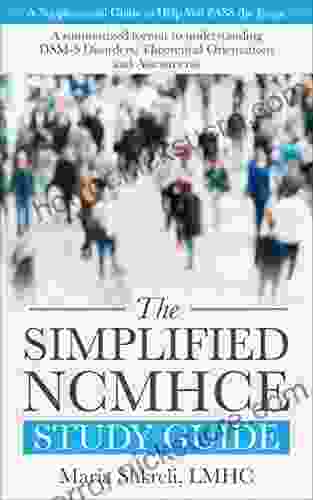Summarizing DSM Disorders: Theoretical Orientations and Understanding Mental Health

The Diagnostic and Statistical Manual of Mental Disorders (DSM) is a comprehensive guide used by mental health professionals to diagnose and classify mental disorders. It provides a standardized set of criteria that clinicians use to assess and diagnose mental health conditions. The DSM is updated periodically to reflect the latest research and advancements in the field of mental health.
Different theoretical orientations or perspectives provide frameworks for understanding and explaining mental disorders. These orientations help clinicians conceptualize the causes, symptoms, and treatment of mental health conditions. Some of the most common theoretical orientations include:
- Psychodynamic: Focuses on early life experiences, unconscious processes, and defense mechanisms.
- Behavioral: Emphasizes the role of learning and environmental factors in shaping behavior.
- Cognitive: Explores how thoughts, beliefs, and perceptions influence behavior and emotions.
- Humanistic: Centers on the individual's subjective experience and emphasizes self-actualization.
- Biopsychosocial: Integrates biological, psychological, and social factors in understanding mental disorders.
The DSM classifies mental disorders based on specific criteria and symptom patterns. The symptoms of a particular disorder may vary depending on the theoretical orientation adopted by the clinician. For example:
4.4 out of 5
| Language | : | English |
| File size | : | 18670 KB |
| Text-to-Speech | : | Enabled |
| Screen Reader | : | Supported |
| Enhanced typesetting | : | Enabled |
| Print length | : | 131 pages |
- Anxiety disorders: Psychodynamic theory may view anxiety as a result of unresolved childhood conflicts, while behavioral theory may focus on avoidance and reinforcement of anxious behaviors.
- Depressive disorders: Cognitive theory may emphasize negative thought patterns and distorted beliefs, while humanistic theory may explore themes of loss, meaninglessness, and isolation.
- Personality disorders: Psychodynamic theory may attribute personality disorders to inflexible defense mechanisms, while behavioral theory may focus on learned maladaptive behaviors.
Comprehending the DSM and its criteria is essential for accurate diagnosis and appropriate treatment planning. Clinicians use the following steps to assess and diagnose mental disorders using the DSM:
- Interviewing: Conducting thorough interviews with the individual to gather information about symptoms, history, and current functioning.
- Observing: Paying attention to the individual's behavior and demeanor during the interview and other interactions.
- Psychological testing: Using standardized psychological tests to assess cognitive, emotional, and personality functioning.
- Reviewing medical records: Examining the individual's medical history for potential biological factors contributing to symptoms.
The theoretical orientation adopted by the clinician influences the choice of treatment interventions. Different orientations suggest varying approaches to therapy, such as:
- Psychodynamic therapy: Focuses on exploring unconscious conflicts and defense mechanisms.
- Cognitive behavioral therapy (CBT): Aims to change maladaptive thought patterns and behaviors.
- Humanistic therapy: Facilitates self-exploration, personal growth, and self-acceptance.
- Biomedical therapy: Utilizes medications and other biological treatments to manage symptoms.
The DSM provides a valuable tool for clinicians in diagnosing and classifying mental disorders. Understanding the different theoretical orientations and their implications for assessment and treatment planning is crucial for accurate diagnosis and effective intervention. By synthesizing various perspectives, clinicians can tailor treatment approaches to the individual's unique needs, leading to improved mental health outcomes.
4.4 out of 5
| Language | : | English |
| File size | : | 18670 KB |
| Text-to-Speech | : | Enabled |
| Screen Reader | : | Supported |
| Enhanced typesetting | : | Enabled |
| Print length | : | 131 pages |
Do you want to contribute by writing guest posts on this blog?
Please contact us and send us a resume of previous articles that you have written.
 Fiction
Fiction Non Fiction
Non Fiction Romance
Romance Mystery
Mystery Thriller
Thriller SciFi
SciFi Fantasy
Fantasy Horror
Horror Biography
Biography Selfhelp
Selfhelp Business
Business History
History Classics
Classics Poetry
Poetry Childrens
Childrens Young Adult
Young Adult Educational
Educational Cooking
Cooking Travel
Travel Lifestyle
Lifestyle Spirituality
Spirituality Health
Health Fitness
Fitness Technology
Technology Science
Science Arts
Arts Crafts
Crafts DIY
DIY Gardening
Gardening Petcare
Petcare Behan Gifford
Behan Gifford Ben O Williams
Ben O Williams Lesley Pyne
Lesley Pyne Roger Eckstine
Roger Eckstine Jessica Misener
Jessica Misener Holly Black
Holly Black Chris Conley
Chris Conley Fran Zimniuch
Fran Zimniuch Dan Inosanto
Dan Inosanto Virginia Smith Harvey
Virginia Smith Harvey Dave Rearwin
Dave Rearwin Charles E Farhadian
Charles E Farhadian Wesley C Salmon
Wesley C Salmon Will Wraxall
Will Wraxall Christian Beamish
Christian Beamish Daniel Boyarin
Daniel Boyarin Joe Farinaccio
Joe Farinaccio Brigid Kemmerer
Brigid Kemmerer Lindsey Vonn
Lindsey Vonn Maggie Kline
Maggie Kline Glenn Bartley
Glenn Bartley Benjamin Smith
Benjamin Smith Bella Bathurst
Bella Bathurst Elizabeth Verdick
Elizabeth Verdick Lisa Rene Reynolds Phd
Lisa Rene Reynolds Phd Lene Fogelberg
Lene Fogelberg Brent Majcher
Brent Majcher Ellen Schreiber
Ellen Schreiber Michael Pollan
Michael Pollan Benjamin Southerland
Benjamin Southerland Ilya Grigorik
Ilya Grigorik Hannah Witton
Hannah Witton Tamarack Song
Tamarack Song T L Branson
T L Branson Helen Leigh
Helen Leigh Molly Hurford
Molly Hurford Brian M Conners
Brian M Conners Vinny Berry
Vinny Berry Karen J Rooney
Karen J Rooney Nancy Redd
Nancy Redd Kindle Edition
Kindle Edition Daniel Muijs
Daniel Muijs Jeff Grubb
Jeff Grubb Joe Clement
Joe Clement Jeremy Lent
Jeremy Lent Santari Green
Santari Green Troy Horne
Troy Horne Jamie C Martin
Jamie C Martin Martin Lee Abbott
Martin Lee Abbott Tim Tebow
Tim Tebow Rui Zhi Dong
Rui Zhi Dong Jay Kirk
Jay Kirk Bruce Kirkby
Bruce Kirkby Tim Ingold
Tim Ingold Ellen Galinsky
Ellen Galinsky Blythe Lucero
Blythe Lucero Tiffany Vincent
Tiffany Vincent John H Holland
John H Holland Edward Beauclerk Maurice
Edward Beauclerk Maurice Oleg Senkov
Oleg Senkov Larry Gabe
Larry Gabe Lisa Mckay
Lisa Mckay Christian Smith
Christian Smith Malin Gutestam
Malin Gutestam David Bain
David Bain Shanterra Mcbride
Shanterra Mcbride Melina Palmer
Melina Palmer Denise Gaskins
Denise Gaskins Dan R Lynch
Dan R Lynch Dennis Fisher
Dennis Fisher Vasile Berinde
Vasile Berinde Dudley Wright
Dudley Wright Sheila Lukins
Sheila Lukins Sharon Bergen
Sharon Bergen Rick Rinehart
Rick Rinehart Mindy Cockeram
Mindy Cockeram Christy Teglo
Christy Teglo Seth A Roberts
Seth A Roberts Esther Hicks
Esther Hicks Gerard Taylor
Gerard Taylor Jeff Ramey
Jeff Ramey Bertil Gustafsson
Bertil Gustafsson Rachel Ann Cullen
Rachel Ann Cullen Nate Summers
Nate Summers Paul Dolan
Paul Dolan John C Lundell
John C Lundell Lelah Sullivan
Lelah Sullivan Leonard Mlodinow
Leonard Mlodinow David Sadker
David Sadker T Edward Nickens
T Edward Nickens Richard G Lomax
Richard G Lomax Olivia Longray
Olivia Longray Brian Reddington
Brian Reddington Lori Ashley Taylor
Lori Ashley Taylor Jenson Button
Jenson Button Bob Raynor
Bob Raynor Sona Charaipotra
Sona Charaipotra Graham Burgess
Graham Burgess Glenn Randall
Glenn Randall Rosamund Hodge
Rosamund Hodge Ben Worthington
Ben Worthington Sandy Glenn
Sandy Glenn Rohan Agarwal
Rohan Agarwal David Jeremiah
David Jeremiah David Estes
David Estes Troy Treasure
Troy Treasure Josh Gates
Josh Gates Scott Wallace
Scott Wallace Nancy Mohrbacher
Nancy Mohrbacher Kate Williams
Kate Williams Kent Allen
Kent Allen Bertrand Russell
Bertrand Russell Emily Glickman
Emily Glickman Adam Stevens
Adam Stevens John D Barrow
John D Barrow Barry King
Barry King Leia Stone
Leia Stone Eliza Larson
Eliza Larson Educational Testing Service
Educational Testing Service Deborah Taylor Hough
Deborah Taylor Hough Bernard Lewis
Bernard Lewis Theodore Gray
Theodore Gray Kelli L Ferguson
Kelli L Ferguson Stephanie Baier
Stephanie Baier Catherine B Walker
Catherine B Walker Stephen Renwick
Stephen Renwick Peter Isler
Peter Isler Terrence Talley
Terrence Talley Stanley Cohen
Stanley Cohen Zecharia Sitchin
Zecharia Sitchin Chris Mcintyre
Chris Mcintyre Maggie Dent
Maggie Dent Howard Burton
Howard Burton Philip A Moore
Philip A Moore Lawrence Baldassaro
Lawrence Baldassaro Natasha D Lane
Natasha D Lane Martijn Konings
Martijn Konings Patricia Leavy
Patricia Leavy Robert W Smith
Robert W Smith Tracy Tresidder
Tracy Tresidder Mark Lutz
Mark Lutz Bernardo Kastrup
Bernardo Kastrup Lou Kasischke
Lou Kasischke Department Of The Army
Department Of The Army Kristin Cashore
Kristin Cashore Peter Rendell
Peter Rendell Cathy Jackson
Cathy Jackson Jane Bottomley
Jane Bottomley Joe Baker
Joe Baker Steve Schwartz
Steve Schwartz Suzanne Bender
Suzanne Bender Sarah Elizabeth Richards
Sarah Elizabeth Richards Cokie Roberts
Cokie Roberts Theresa Bane
Theresa Bane Holly Parker
Holly Parker Colin Fletcher
Colin Fletcher Portia Iversen
Portia Iversen Prem Carnot
Prem Carnot Kevin Easley
Kevin Easley Si Sheppard
Si Sheppard John J Watkins
John J Watkins Patricia B Mcconnell
Patricia B Mcconnell Will Oxley
Will Oxley Patricia Hachten Wee
Patricia Hachten Wee David Quammen
David Quammen Ciara Attwell
Ciara Attwell Chris Batha
Chris Batha Evelyn Underhill
Evelyn Underhill Bb Easton
Bb Easton Jo Carol Claborn
Jo Carol Claborn S Connolly
S Connolly Makiia Lucier
Makiia Lucier Kyle Simpson
Kyle Simpson Phil Jarratt
Phil Jarratt Justin Roethlingshoefer
Justin Roethlingshoefer Lawrence J Cohen Phd
Lawrence J Cohen Phd Sandra Brown
Sandra Brown Naomi Steiner
Naomi Steiner Janisse Ray
Janisse Ray Meghan Casey
Meghan Casey Stephen K Hayes
Stephen K Hayes Rebecca Collins
Rebecca Collins Jacqueline Marcell
Jacqueline Marcell John Mandel
John Mandel Margaret E Murie
Margaret E Murie Maggie Oakes
Maggie Oakes Stephen Jenkinson
Stephen Jenkinson Connie Zweig
Connie Zweig Rough Guides
Rough Guides Mitch Terrusa
Mitch Terrusa Rowan Ellis
Rowan Ellis Laurence S Moy
Laurence S Moy Jo Boaler
Jo Boaler Albert S Tarendash
Albert S Tarendash Brandon Sanderson
Brandon Sanderson Budd Coates
Budd Coates Jonathan Wolf
Jonathan Wolf Lauren Wells
Lauren Wells Sally Moran
Sally Moran David Barrie
David Barrie Shelley C Safian
Shelley C Safian James Henry Breasted
James Henry Breasted Richard Dawkins
Richard Dawkins Tony Horwitz
Tony Horwitz Joy Hendry
Joy Hendry Neil Iton
Neil Iton John Grasso
John Grasso T L Christianson
T L Christianson Jonathan Knight
Jonathan Knight Haya Leah Molnar
Haya Leah Molnar Linda Spatig
Linda Spatig Peter Brown Hoffmeister
Peter Brown Hoffmeister Christopher Hill
Christopher Hill Bill Jamison
Bill Jamison Chris Cage
Chris Cage Stefanie Molin
Stefanie Molin Matt Jacobson
Matt Jacobson Stefanie Reinhold
Stefanie Reinhold Kara Richardson Whitely
Kara Richardson Whitely Sarah Miller
Sarah Miller Rachael Denhollander
Rachael Denhollander Carla Killough Mcclafferty
Carla Killough Mcclafferty Mark Csikszentmihalyi
Mark Csikszentmihalyi Roxanne Reid
Roxanne Reid Les Carter
Les Carter Declan Lyons
Declan Lyons John Biggar
John Biggar Nicola Morgan
Nicola Morgan Beth Baker
Beth Baker Julie L Hall
Julie L Hall Simon Armitage
Simon Armitage Patti Jean
Patti Jean Bill Hanstock
Bill Hanstock Kim Vopni
Kim Vopni L T C Rolt
L T C Rolt Shelia Craig Whiteman Pt Dpt Clt
Shelia Craig Whiteman Pt Dpt Clt Eva Hoffman
Eva Hoffman Christy Dorrity
Christy Dorrity Charlotte Mason
Charlotte Mason Alan Levinovitz
Alan Levinovitz Chanda Hahn
Chanda Hahn Kevin Johnson
Kevin Johnson C C Hunter
C C Hunter Scott Imhoff Phd
Scott Imhoff Phd Meghan Mccarthy
Meghan Mccarthy Editors Of Martha Stewart Living
Editors Of Martha Stewart Living Bernadette Mcdonald
Bernadette Mcdonald Steven Rinella
Steven Rinella Jack Buck
Jack Buck Monica Swanson
Monica Swanson Lawrence Wright
Lawrence Wright Tony Frezza
Tony Frezza Vivienne Edgecombe
Vivienne Edgecombe Rosalie Knecht
Rosalie Knecht Tomoko Fuse
Tomoko Fuse Peggy J Martin
Peggy J Martin Bell Hooks
Bell Hooks Lizzy Bolan
Lizzy Bolan Jaimal Yogis
Jaimal Yogis Lawrence S Leff
Lawrence S Leff Bernadette Noll
Bernadette Noll Stacey Barrett
Stacey Barrett Gary Oberg
Gary Oberg Jordan Rivet
Jordan Rivet Roger Fredericks
Roger Fredericks Greg Schwipps
Greg Schwipps Valentin Nugmanov
Valentin Nugmanov Peter Greyson
Peter Greyson Mike Veny
Mike Veny Eva Robild
Eva Robild Ricki Linksman
Ricki Linksman Matthew Stein
Matthew Stein Thomas Norman Dewolf
Thomas Norman Dewolf Melissa De La Cruz
Melissa De La Cruz Gerald G Briggs
Gerald G Briggs Jill H Rathus
Jill H Rathus Len Mcdougall
Len Mcdougall Maria Kriya
Maria Kriya Colin Gordon
Colin Gordon Ellen Meloy
Ellen Meloy David Rynecki
David Rynecki Rich Johnson
Rich Johnson Nathan Doneen
Nathan Doneen Julie Urbanski
Julie Urbanski Eric Provan
Eric Provan Scott A Hatch
Scott A Hatch John Branch
John Branch Ben Smith
Ben Smith Ben Gillman
Ben Gillman Mike Settele
Mike Settele Deborah Blum
Deborah Blum John Henderson
John Henderson Harriet A Washington
Harriet A Washington Leila Kalmbach
Leila Kalmbach Mikki Morrissette
Mikki Morrissette Mary V Solanto
Mary V Solanto Zoe S
Zoe S Don L Gates
Don L Gates Dorian Gerhold
Dorian Gerhold William C Oakes
William C Oakes Sarah Spencer
Sarah Spencer Shelby Evans
Shelby Evans Kalliope Barlis
Kalliope Barlis Knowledge Flow
Knowledge Flow Charlotte Mary Yonge
Charlotte Mary Yonge Edward O Wilson
Edward O Wilson Dean R Giles
Dean R Giles Emma Mckinney
Emma Mckinney Thomas W Miller
Thomas W Miller Ben Hoppe
Ben Hoppe Rich Roll
Rich Roll Christine Desdemaines Hugon
Christine Desdemaines Hugon Benjamin Johnston
Benjamin Johnston Erin Eileen Leigh
Erin Eileen Leigh Joe Baird
Joe Baird Nick Price
Nick Price Craig Childs
Craig Childs William J Callaway
William J Callaway W David Pierce
W David Pierce Kayla Small
Kayla Small Phil Stamper
Phil Stamper Janice K Ledford
Janice K Ledford Lsatmax Lsat Prep
Lsatmax Lsat Prep The Mountaineers
The Mountaineers Kenneth R Miller
Kenneth R Miller Jeremy Griffith
Jeremy Griffith Eliza Hof
Eliza Hof Kris Wilder
Kris Wilder Nicholas Griffin
Nicholas Griffin Percy Keese Fitzhugh
Percy Keese Fitzhugh Michael S Kelly
Michael S Kelly Nsca National Strength Conditioning Association
Nsca National Strength Conditioning Association James Blake
James Blake Stephen Smith
Stephen Smith Lebawit Lily Girma
Lebawit Lily Girma Ben Crawford
Ben Crawford Gooseberry Patch
Gooseberry Patch Lucy Cooke
Lucy Cooke Catherine White
Catherine White Rose Kearney Nunnery
Rose Kearney Nunnery Marian L Tupy
Marian L Tupy Sarah Maclean
Sarah Maclean Adam Griffith
Adam Griffith Stuart James Amei
Stuart James Amei Blandine Calais Germain
Blandine Calais Germain Sherry Turkle
Sherry Turkle Gwen Bettwy
Gwen Bettwy Octavia Steen
Octavia Steen Emma Walker
Emma Walker Susan Wildes
Susan Wildes Tracy Lash Decrosta
Tracy Lash Decrosta Heroes Of The Art
Heroes Of The Art Clifford E Trafzer
Clifford E Trafzer Farley Mowat
Farley Mowat Lucy Ruddle
Lucy Ruddle L H Stacey
L H Stacey Carol Walters
Carol Walters John Dickie
John Dickie Christy Mihaly
Christy Mihaly Mike Brown
Mike Brown Huntley Fitzpatrick
Huntley Fitzpatrick Rainbow Rowell
Rainbow Rowell John R Bruning
John R Bruning Slavka Bodic
Slavka Bodic Kim John Payne
Kim John Payne Chuck Lukacs
Chuck Lukacs Khoi Tu
Khoi Tu Scott Wilson
Scott Wilson Peter Gieler
Peter Gieler Dan Orr
Dan Orr Joline Godfrey
Joline Godfrey Gaby Melian
Gaby Melian Melissa Ford
Melissa Ford Bethany Warren
Bethany Warren David Diaz
David Diaz Carol Devine
Carol Devine David Lawson Phd
David Lawson Phd Debbie Marks
Debbie Marks Christina Hitchcock
Christina Hitchcock Tom Dodd
Tom Dodd Izaak Walton
Izaak Walton Nicola Griffith
Nicola Griffith Liz Robbins
Liz Robbins Ethan Sawyer
Ethan Sawyer Joshua Rodriguez
Joshua Rodriguez John Huggan
John Huggan Catherine Faherty
Catherine Faherty Lizzie Lane
Lizzie Lane Joseph Ciarrochi
Joseph Ciarrochi Michael P Nordvall
Michael P Nordvall Deborah D Gray
Deborah D Gray Phil Davies
Phil Davies Jean Louis Vidal
Jean Louis Vidal Frank Ayres
Frank Ayres Mario Cardano
Mario Cardano Phil Martin
Phil Martin John Taylor
John Taylor Clifford Geertz
Clifford Geertz Henri De Lestapis
Henri De Lestapis Sanjay Gupta
Sanjay Gupta Paul Bellow
Paul Bellow William Cane
William Cane Buck Collins
Buck Collins Casey Schreiner
Casey Schreiner John E Eck
John E Eck Timothy Gowers
Timothy Gowers Elaine Stillerman
Elaine Stillerman Stan Byrdy
Stan Byrdy Beth Reekles
Beth Reekles Joel Hooks
Joel Hooks Robert Page
Robert Page Hillary Sadler
Hillary Sadler Drew Estell
Drew Estell Ken M Harrison
Ken M Harrison Deanna Raybourn
Deanna Raybourn Laura Bashar
Laura Bashar Stephan A Hoeller
Stephan A Hoeller John Fry
John Fry Laura Hoggins
Laura Hoggins Darcy Kieran
Darcy Kieran Bob Hazard
Bob Hazard Ashley Lecker
Ashley Lecker Nadine Slavinski
Nadine Slavinski Heather Davis
Heather Davis Oliver Sacks
Oliver Sacks Molly Mills
Molly Mills Scott Wetzler
Scott Wetzler Brian Sparks
Brian Sparks Kurt Jacobs
Kurt Jacobs Fr Mike Driscoll
Fr Mike Driscoll George Daniel
George Daniel Emily Alison
Emily Alison James Allen
James Allen Art Friedman
Art Friedman Brett Cyrgalis
Brett Cyrgalis Peter L Berger
Peter L Berger Bill W
Bill W Eileen Kennedy Moore
Eileen Kennedy Moore Prof Dr Wa Liebenberg
Prof Dr Wa Liebenberg David Robson
David Robson Print Replica Kindle Edition
Print Replica Kindle Edition Ahlia Rose
Ahlia Rose Hansa Bhargava
Hansa Bhargava Gerad Kite
Gerad Kite Kiera Cass
Kiera Cass Rick Wiebe
Rick Wiebe Frank Galli
Frank Galli Jon M Sweeney
Jon M Sweeney
Light bulbAdvertise smarter! Our strategic ad space ensures maximum exposure. Reserve your spot today!
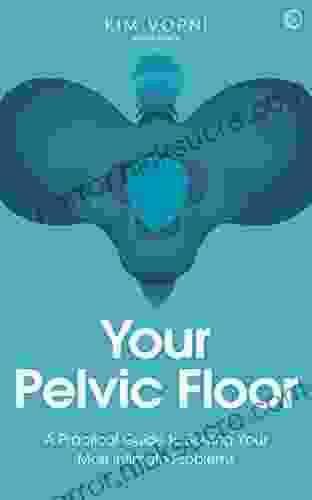
 Will WardPractical Guide to Solving Your Most Intimate Problems: Unlocking Fulfillment...
Will WardPractical Guide to Solving Your Most Intimate Problems: Unlocking Fulfillment...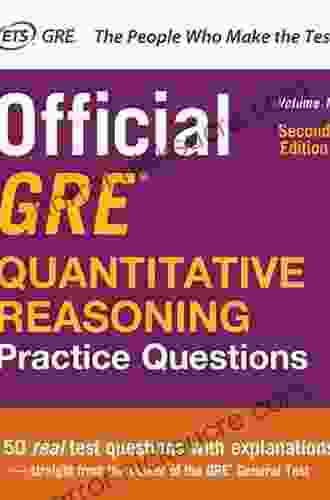
 Darren NelsonOfficial GRE Quantitative Reasoning Practice Questions: A Comprehensive Guide...
Darren NelsonOfficial GRE Quantitative Reasoning Practice Questions: A Comprehensive Guide... David MitchellFollow ·11.5k
David MitchellFollow ·11.5k Leslie CarterFollow ·15.3k
Leslie CarterFollow ·15.3k Sidney CoxFollow ·17.5k
Sidney CoxFollow ·17.5k Todd TurnerFollow ·6.4k
Todd TurnerFollow ·6.4k Forrest ReedFollow ·15.2k
Forrest ReedFollow ·15.2k Avery SimmonsFollow ·16.6k
Avery SimmonsFollow ·16.6k Ken SimmonsFollow ·11.1k
Ken SimmonsFollow ·11.1k Desmond FosterFollow ·13.2k
Desmond FosterFollow ·13.2k

 Matt Reed
Matt ReedStudying for Your Policing Degree: Critical Study Skills...
Pursuing a policing degree...
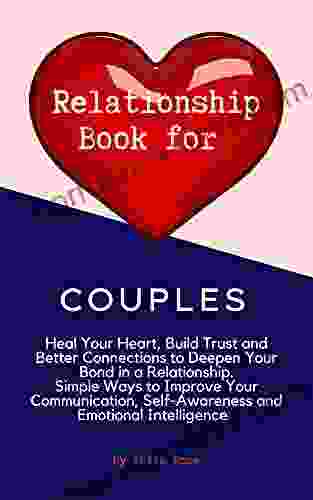
 Mike Hayes
Mike HayesHeal Your Heart, Build Trust, & Better Connections To...
In this article,...
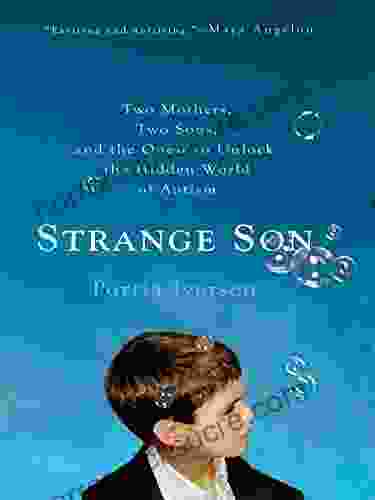
 Drew Bell
Drew BellTwo Mothers, Two Sons, and the Quest to Unlock the Hidden...
When their sons were diagnosed with...

 Bobby Howard
Bobby HowardUnveiling the Rivkah Remnant: Lou Kasischke's Unwavering...
In the tapestry of Christian history,...
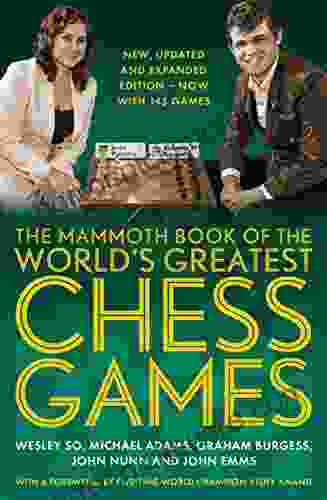
 Alex Foster
Alex FosterThe Mammoth of the World's Greatest Chess Games: An...
Chess, a game of strategy, intellect,...
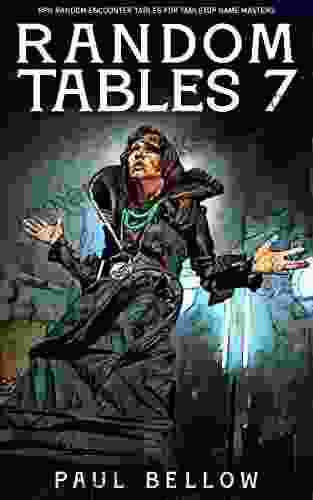
 Aldous Huxley
Aldous HuxleyRandom Tables Fantasy RPG: Random Encounter Tables for...
In the vast tapestry of tabletop role-playing...
4.4 out of 5
| Language | : | English |
| File size | : | 18670 KB |
| Text-to-Speech | : | Enabled |
| Screen Reader | : | Supported |
| Enhanced typesetting | : | Enabled |
| Print length | : | 131 pages |


